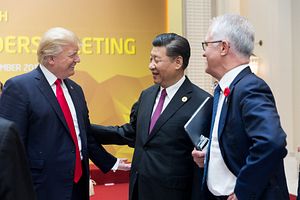November 11 (double eleven) probably has no special meaning outside China, but it does here. Originally a made-up holiday for singles, it has evolved to be a day of nationwide spending extravaganza that dwarfs Black Friday as the world’s largest shopping spree.
This year’s double eleven had an official warm-up of sorts. Amidst U.S. President Donald Trump’s state visit to China, business representatives gathered in Beijing on November 9 and signed a series of agreements valued at $253.5 billion, the largest commercial deal between any two countries.
At the signing ceremony, Trump gave a short speech on bilateral economic relations. He gently urged China to “achieve a level economic playing field,” complaining mildly about the current “very one-sided and unfair one.” Then he said the following:
But, but, I don’t blame China. After all, who can blame a country for being able to take advantage of another country for the benefit of its citizens? I give China great credit. In actuality, I do blame past administrations for allowing this out of control trade deficit to take place and to grow.
Who would have anticipated Trump, a harsh critic of China’s trade practices in his presidential campaign, would praise and defend those same practices? He dropped a rhetorical bomb in Beijing and Washington. His Chinese audience could not have more happily surprised. For many of his supporters back at home, however, these remarks represent an outright betrayal of one of his core campaign promises. For those Americans who have been skeptical of his ability to handle one of the world’s most complicated bilateral relationships, what he said is evidence of a naive president easily swooned by his sophisticated Chinese host.
Actually, there is much truth in what Trump said. Most countries try to take advantage of other countries for the benefit of their own citizens, though only a small number of them have had a shining record. The United States is certainly the most successful in doing so, at least since the end of World War II. A primary purpose of the liberal international order, one can argue, is to perpetuate America’s abilities to take full advantage of the rest of the world. Besides, Beijing does deserve great credit for delivering extraordinary benefits to the world’s largest population, even if that unprecedented task was achieved at the costs of some other countries.
Regardless, there are increasing calls for the U.S. president to stand up against his Chinese counterpart, with whom he seems to have some genuine rapport. One former senior State Department official under the Obama administration has accused Trump of “conceding global leadership to China,” while another former National Security Council official who served under George W. Bush has called on him to “counter China’s increasingly assertive foreign policy.”
Trump would not miss the bitter irony here. During his campaign and in the first months of his presidency, the foreign policy establishment in Washington was deeply worried about his upsetting the boat of U.S.-China relations, yet as he reaches out to Beijing to put the boat on a steady course, he is disparaged as selling out America to China.
His dilemma raises larger questions about U.S. China policy. Since Richard Nixon’s 1972 visit, successive presidents have adopted engagement as their default China policy, notwithstanding occasional and short-term deviations from that policy. Admittedly China has benefited immensely from U.S. engagement. Its economic growth in the past four decades would have been much less spectacular — if not impossible — had it not been for continued access to America and its allies’ capital, technology, and managerial expertise. At the same time, one must not forget that American businesses and consumers also have reaped enormous benefits from exports to, imports from, and investment in China. The benefits of engagement certainly go both ways.
Yet as China is fast becoming prosperous, peaceful, and stable — a wish repeatedly expressed by U.S. presidents — some elites in Washington seem to have increasing misgivings about the wisdom of that policy. Does engagement mean only the rise of a China molded in America’s own image and submissive to Washington? What options does the United States have if engagement leads to a wealthy and powerful China that is willing and able to challenge U.S. global leadership, and whose political institutions and values appear to represent a viable alternative to the so-called Washington Consensus?
If engagement was intended as a “hundred-year marathon” to transform China into another Western Europe or Japan, then Washington should be prepared for profound disappointment. China is too big (both geographically and demographically) and is becoming too powerful (both economically and militarily) to perennially play second fiddle to American leadership.
In the end, both Beijing and Washington should recognize that global leadership is not preordained, but has to be earned through strength, diplomacy, and example. More important, no country — not even the mighty Roman Empire or the sun-never-setting British Empire — is entitled to permanent global leadership. History is full of cycles, just as nature has four seasons. It seems that time has arrived for the Middle Kingdom to reclaim its rightful place under the heaven. It also seems that America is sliding into an extended period of decay, just as China did starting from the early 19th century.
Maybe this is the first and last time that a U.S. president gets a “state visit plus” from his Chinese host. Maybe the bilateral relationship will soon embark on a downward trajectory due to pressure from foreign policy elites in Washington. Regardless, one thing is almost certain: Trump has become another old friend of the Chinese people.
Welcome back to China, Mr. Trump.

































